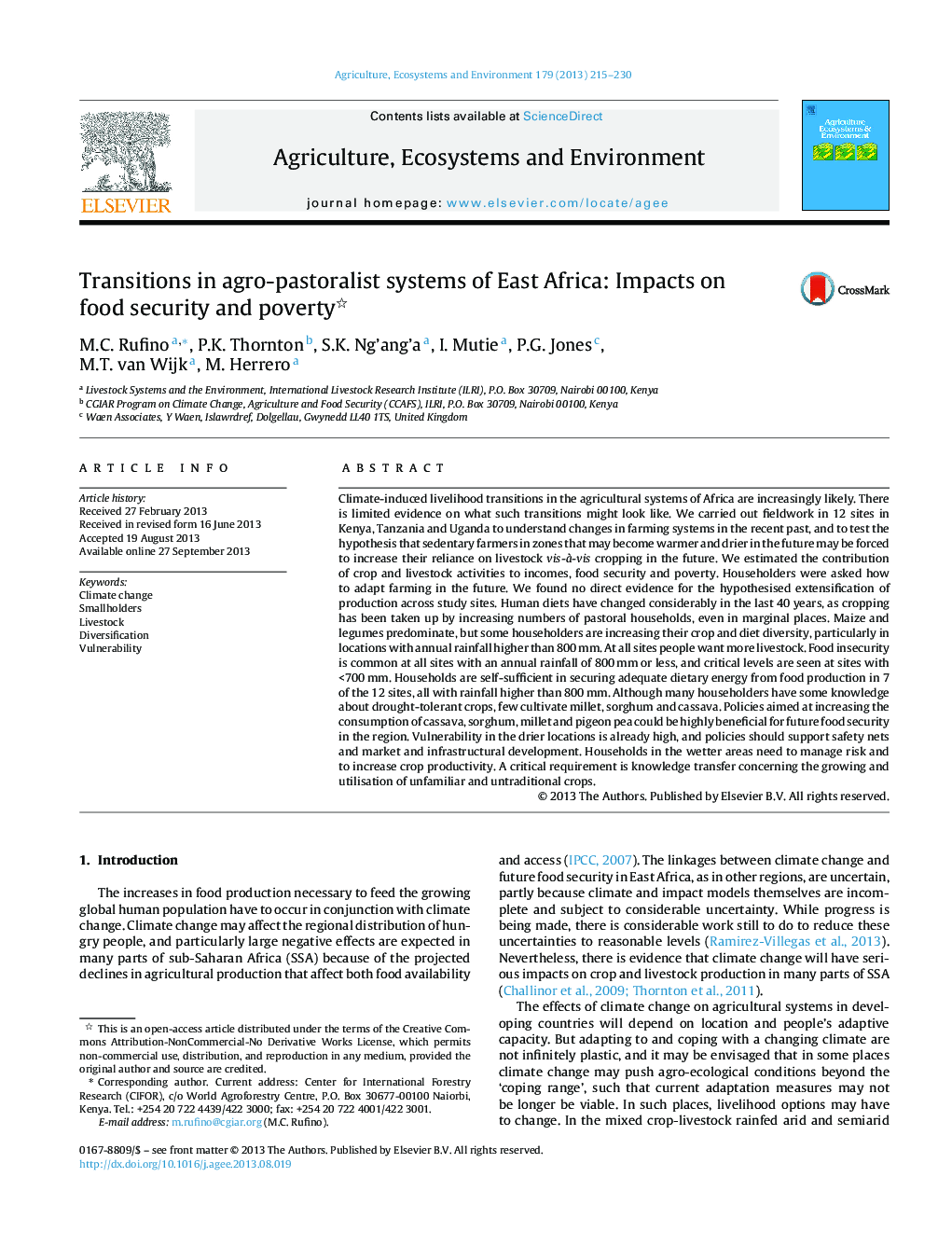| کد مقاله | کد نشریه | سال انتشار | مقاله انگلیسی | نسخه تمام متن |
|---|---|---|---|---|
| 8488106 | 1552073 | 2013 | 16 صفحه PDF | دانلود رایگان |
عنوان انگلیسی مقاله ISI
Transitions in agro-pastoralist systems of East Africa: Impacts on food security and poverty
ترجمه فارسی عنوان
تغییر در سیستم های کشاورزی و دامپروری شرق آفریقا: تأثیر بر امنیت غذایی و فقر
دانلود مقاله + سفارش ترجمه
دانلود مقاله ISI انگلیسی
رایگان برای ایرانیان
کلمات کلیدی
تغییر آب و هوا، سهامداران کوچک، دامداری، تنوع آسیب پذیری،
موضوعات مرتبط
علوم زیستی و بیوفناوری
علوم کشاورزی و بیولوژیک
علوم زراعت و اصلاح نباتات
چکیده انگلیسی
Climate-induced livelihood transitions in the agricultural systems of Africa are increasingly likely. There is limited evidence on what such transitions might look like. We carried out fieldwork in 12 sites in Kenya, Tanzania and Uganda to understand changes in farming systems in the recent past, and to test the hypothesis that sedentary farmers in zones that may become warmer and drier in the future may be forced to increase their reliance on livestock vis-Ã -vis cropping in the future. We estimated the contribution of crop and livestock activities to incomes, food security and poverty. Householders were asked how to adapt farming in the future. We found no direct evidence for the hypothesised extensification of production across study sites. Human diets have changed considerably in the last 40 years, as cropping has been taken up by increasing numbers of pastoral households, even in marginal places. Maize and legumes predominate, but some householders are increasing their crop and diet diversity, particularly in locations with annual rainfall higher than 800Â mm. At all sites people want more livestock. Food insecurity is common at all sites with an annual rainfall of 800Â mm or less, and critical levels are seen at sites with <700Â mm. Households are self-sufficient in securing adequate dietary energy from food production in 7 of the 12 sites, all with rainfall higher than 800Â mm. Although many householders have some knowledge about drought-tolerant crops, few cultivate millet, sorghum and cassava. Policies aimed at increasing the consumption of cassava, sorghum, millet and pigeon pea could be highly beneficial for future food security in the region. Vulnerability in the drier locations is already high, and policies should support safety nets and market and infrastructural development. Households in the wetter areas need to manage risk and to increase crop productivity. A critical requirement is knowledge transfer concerning the growing and utilisation of unfamiliar and untraditional crops.
ناشر
Database: Elsevier - ScienceDirect (ساینس دایرکت)
Journal: Agriculture, Ecosystems & Environment - Volume 179, 1 October 2013, Pages 215-230
Journal: Agriculture, Ecosystems & Environment - Volume 179, 1 October 2013, Pages 215-230
نویسندگان
M.C. Rufino, P.K. Thornton, S.K. Ng'ang'a, I. Mutie, P.G. Jones, M.T. van Wijk, M. Herrero,
